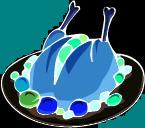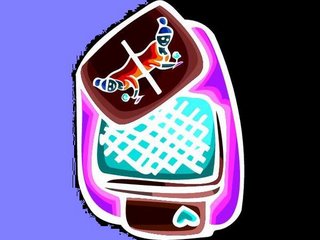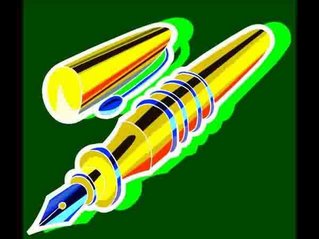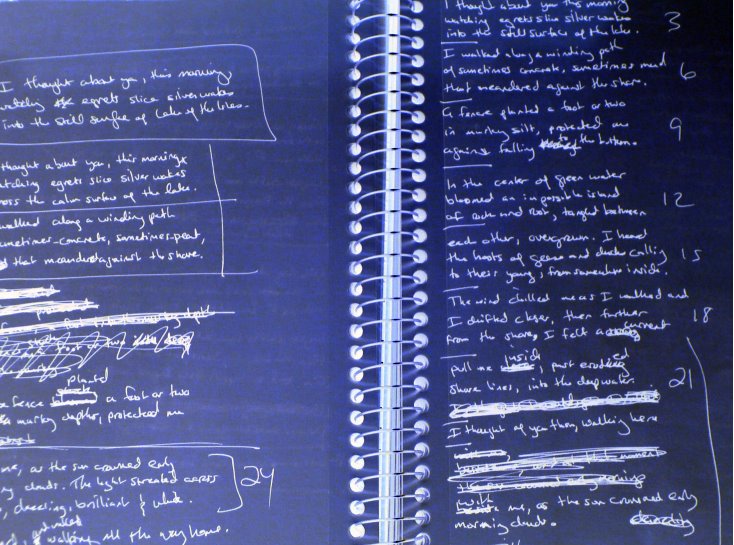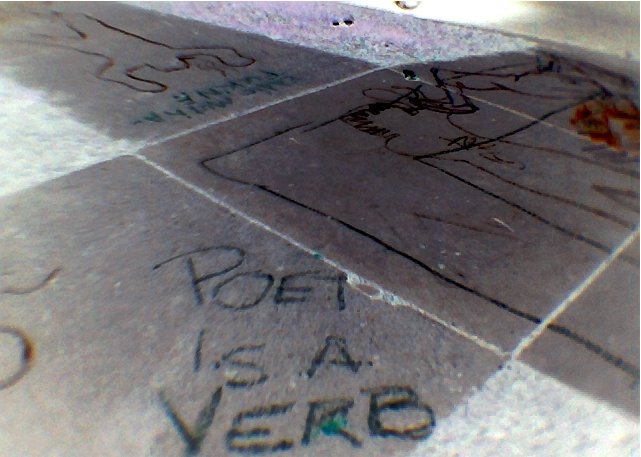Sunday, December 31, 2006
In Memoriam 2006
Posted by Jessica at 9:13 AM 0 comments
Labels: famous writers, working writers
New Year, New Beginnings
Posted by Jessica at 8:48 AM 0 comments
Labels: New Year's Goals
Friday, December 29, 2006
Not Knowing
Posted by Jessica at 8:19 AM 0 comments
Labels: successes
Thursday, December 28, 2006
A Brilliant Idea -- Poetry Thursdays
Poetry Thursday is a collective project for poets on the web, organized by two moderators. On Mondays, the moderators post a writing exercise that is due on the following Thursday. After Thursday rolls around, people who accomplished the exercise and want to share post their results on their blog, then send the moderators the link. The moderators then post all the links and instant poetry community.
I'm going to try to start the Poetry Thursday exercise, just to get those poetry muscles working.
Posted by Jessica at 3:29 PM 0 comments
Labels: Poetry Thursdays, Technology and Writing, Writing Relationships
Wednesday, December 27, 2006
This is what writers do when they marry...
Posted by Jessica at 7:33 AM 0 comments
Labels: successes, Writing Relationships
Monday, December 25, 2006
Deborah Keenan, working writer
Posted by Jessica at 11:03 AM 0 comments
Labels: working writers, Writing Relationships
Wednesday, December 20, 2006
My Favorite Writer... This Week
Posted by Jessica at 9:01 PM 0 comments
Labels: working writers
Friday, December 15, 2006
Intersection of Art & Language
Posted by Jessica at 7:55 AM 0 comments
Labels: art and writing
Monday, December 11, 2006
For Word Nerds Only
Posted by Jessica at 8:54 PM 0 comments
Labels: linguistics
Monday, December 4, 2006
R.I.P.
We’ve been sputtering along for a good 4 months, broken, but still running. It reminds me of when a car’s dying… you can feel it when you drive, but you can’t quite locate the problem. Is the rattling coming from the carburetor? Do I smell smoke, or am I just imagining it?
Overall, I feel conflicted about the writing group process. I’ve been involved in several writer’s groups over my life and they seem to all follow the same process.
1) At first, belonging to the writer’s group inspires me. I have deadlines and people to read my work and I love it. I burn through new work and I’m excited to discuss it.
2) At some point, I begin to slow. Perhaps it’s the monotony of a writing practice or the pressure of the same deadlines that once inspired me, but the writing isn’t as easy or enjoyable as it could be. I continue to plow through work, but it feels hollow and false.
With this current group, I’ve been at this stage for a good five months, if truth be told. For most deadlines, my writing has been mediocre, at best, and I feel like I’m just going through the motions.
3) Around the same time, I start noticing that I am receiving the same critiques over and over again. If the critique is constructive, rather than positive, it can turn cruel at times. Then, I’m molding my writing to fit this critique that I don’t necessarily agree with or understand. In some ways, it’s necessary to have this outside critique that gives you a different perspective. But in others, it’s claustrophobic.
In the case of the current writer’s group, positive critique handcuffed me to a project that they loved and I did not. Writing became this unbearable chore and I lost that feeling of immersion in my writing.
4) Members begin to spin off, equally disenchanted with the work and the group. There’s always an early exodus, before the true dissolution of the group.
With this group, we’ve been cycling through members almost since the inception. (I’m actually a newer addition than two of the current members.) Sometimes, losing the members allowed us to progress, but at other times, it seemed like we lost a certain momentum and cohesiveness when we lost key people.
5) Group dies completely. I’m left with a half done project and a desire to have an audience for critique, without all the drama.
I know I’ve painted this process in a wholly negative light, which is not entirely my intention. I am grateful to my writer’s group for helping me to commit to my writing over the past year and a half. I think I’ve made some big strides with this group, including my return to writing fiction after an 8 year commitment to poetry. I also believe I’ve made good friendships within this group and found some kindred spirits in the struggle to work and write at the same time.
But I’ve also, through this group, lost touch with my poetry (being the only poet in a group of fiction writers). I think, overall, I’ve grown as much as I can with this group and I’m left with the same old options: toil alone at my writing or find a new community, and hope for a way to break the writer’s group cycle.
Posted by Jessica at 9:08 PM 0 comments
Labels: struggles
Saturday, December 2, 2006
Schedules
At the end of my time, I was able to enter my progress into my writing schedule worksheet. I’m obsessed with all things Excel. I use it to organize everything, but it is especially helpful for my writing practice. My husband lent me the Excel sheet that he’s using to track his project with his novel, and now I’m hooked.
It sounds a bit OCD, I know, but using an Excel sheet to track my progress allows me to see a lot about my writing habits. I give myself goals – 4 hours of time and 6 pages of writing – per week. Then, I enter my time and page rate into my sheet. Overall, it allows me to see what days and times work best for my writing practice.
Of course, entering a long string of zeros (during my slow periods) feels like crap, but an honest evaluation of my progress (and regress) is the only way I can improve as a writer.
Posted by Jessica at 3:15 PM 0 comments
Labels: successes
Monday, November 27, 2006
Fallow Periods
Of course not. Yet, I sit down to write anyway, just as I tell my students, and nothing comes out. Or I just stare off into space, somewhere above my computer, and waste my time not writing. Worse yet, I do write and what comes out is a weak and painful trickle, about a paragraph's worth.
In college, with my friends, we had names for it. "Writer's sludge" was my favorite. It's somewhere in between a complete and total blockage and the aforementioned trickle. When I was in college, I had the time to work through the sludge and break through. It's such a rare and amazing feeling at that moment when I break through and start creating again.
Now that I've got only between a half an hour and an hour a day to write, how can I get my rhythm without the painful yet rewarding process of blocking then breaking? I turned to the internet, and of course, found some interesting tangential information, but mostly the same old advice.
In between the "just do its" and the "create a writing practice" advice listings, I found these two articles:
1) New Yorker article -- This ran two years ago, but it poses an interesting theory. Apparently, when we moved away from the logical process to the "creative process" within writing, we gained Writer's Block. Apparently, when I was citing inspiration as an almost divine act, I was espousing a Romantic notion.
2) McSweeney's article -- This is also an old one -- yet it 's very funny. A humorous look at Writer's Block and what's really wrong with writing and not writing.
3) Sydney Herald article -- More recent -- about famous authors who have famously stopped writing. We're not alone.
So for now, I get to suffer in my little writer's block/sludge phases and hope that they pass. Besides, I have something do in writer's group on Friday. If that doesn't inspire me, I don't know what will.
Posted by Jessica at 8:31 PM 0 comments
Labels: struggles
Wednesday, November 22, 2006
Giving Thanks
So, in the spirit of the day before Thanksgiving, before I have to clean my entire house in preparation for my mother's arrival, while I am watching the Minneapolis sky turn light blue as the sun rises, here is what I am thankful for:
1) My family -- I am very lucky to have a husband, 2 kitties, 2 parents, and a sibling who love me unconditionally. Every day, I try to remember how lucky I am to have these people & animals in my life.
2) My home -- It's getting cold here in Mpls, and I know that I am very blessed that I have a safe place to live and work.
3) My friends -- I have an eclectic amalgamation of friends who I have kept track of semi-successfully over the years. These are the people who have known me through all of my embarrassing phases and transformations and who still love me. (A special thank you should be mentioned for my Mpls. guy friends who stuck with me once I discovered feminism and the Womyn's Center in college.)
4) My writing -- There are times when it seems more like a burden, a chore, a curse, and a failed attempt at expression. (Often all at the same time.) But there are also times when I am driven out of bed, a la Alice Walker's "I Said to Poetry" and I feel so thankful for those moments of sudden inspiration.
There are a million other small things that I have to be thankful for, everything from computers and cars and addictive television shows/movies, to the brilliant pink sunrise outside my window this morning. But these are my major blessings that I have experienced throughout my life.
So, hopefully, while I'm stuffing myself silly, I'll be able to remember this list. What are you thankful for?
Posted by Jessica at 6:43 AM 0 comments
Labels: successes
Monday, November 20, 2006
Penis Envy (Sort of) in Writing
Ideally, writers, when confronted with a sublime example of their art, are inspired to produce work on their own. Perhaps, it inspires an homage to the original work of art. Or, perhaps, the artists are invigorated, ready to confront their work with a new perspective or new verve.
Confrontation with a work of perfect human creation should be, for artists, a confrontation with the divine. When I say divine, I do not necessarily mean the hand of God, although that is what the word is originally derived from. I only mean the contact with something outside of ourselves, that must be expressed through our art. In fact, American Heritage dictionary, cites one of the definitions of inspiration as "Divine guidance or influence exerted directly on the mind and soul of humankind."
But confrontation with the divine is both splendid and terrifying. Splendidly terrifying. It is terrifying precisely because when a piece of writing or art is so perfectly composed, we can no longer detect the human creator behind the art. It becomes a seamless work of art that seems to be natural. We forget that the quality is not intrinsic to the product; it is there because of the artist. A human artist, with weakness and insecurity and failings, like every other writer or artist out there.
Now, I'm not saying that The Prestige is divine, but it is damn good. But inside its story, my husband was confronted, momentarily, with something special outside of himself. And it devastated him, because he did not know whether or not he would ever produce that same effect on another person. My husband is at that stage in the creative process where his work is still new and tender. It needs nurturing and work, not the evidence of some other writer's brilliant and seemingly seamless handiwork.
I remember, for me, when I was writing my master's thesis that I had that moment. I was a masochist enough to read the early books of many of my favorite writers. I figured at the time that if I could see their unsure, early work I would be encouraged on my own. Instead, I came across a book that inspired me to a full-on breakdown, complete with tears and assumptions of failure. It was called Ararat, by Louise Gluck. The book was so beautiful and layered and complex, everything I wanted my book to be, that I thought I could never compare. And let's be honest, it's Louise Gluck -- I'm not in the same stratosphere. Once I remembered that, and became okay with that, my writing continued.
So, this week it's The Prestige for my husband and once upon a time Ararat for me. What piece of art was it for you that made you want to quit? How did you survive it?
Posted by Jessica at 8:37 PM 0 comments
Labels: struggles, Writing Relationships
Wednesday, November 15, 2006
Wasting Time -- One in a Series
I originally was going to write about some of my fun & common time waster, but the one that struck me today was stress. Stress is probably the biggest reason for wasting time I have in my creative life. Stress is my most typical excuse for not writing, and my most typical excuse for my more destructive habits. It is as if having a moderately stressful and responsibility laden job absolves me of any creative effort. I can just lounge away my evenings and weekends, in my PJs, all thanks to stress.
I have two or three concurrent stress patterns. My typical stress thinking goes something like this: Man, I have had a stressful day. I don't feel like writing/I can't write. Or it could go something closer to: Man, what a stressful day, I deserve time off. (Deserve is a typical stress word for me. I don't deserve this stress, but I do deserve this 3 hour television watching spree.) Often times, these stress thinking patterns intersect, giving me the double dose of I don't feel like writing and I deserve time off.
Stress is a hungry time waster. While it can take the little bursts of time, it most often results in a lost evening or weekend. I drift in a semi-comatose state, seeking only pleasure and relief while creating absolutely nothing.
The kicker of it is, of course, that my biggest stress reliever is writing. For many artists, this is the case. Writing/Art is the one release we have from the stresses of daily life. Through our art, we can have the flow experience, that moment where we lose ourselves within the act of creation. What can be better than that?
So how do we, how do I, break this cycle of stress & not creating? Easy answer: create new cycles of stress & creation. This is something that I have struggled to include in my writing practice. Sometimes, like today, it is successful. Other times, it isn't. But I can only work to connect pleasure and stress relief with my creation, through practice, rather than tying it to that other obligation that only exists to stress me out.
Posted by Jessica at 8:11 PM 0 comments
Labels: struggles, wasting time
Monday, November 13, 2006
What I Tell My Students
As a teacher, I force my students to journal 3-4 days a week. Sometimes it feels like forcing, sometimes it doesn't. To be completely honest, this is more than I journal, myself. I use quotes as starting points for discussion and inspiration, and then ask them to respond to it in writing for 10-15 minutes. As first week quotes, I use the following two:
If not, when? If not me, then who? -- Talmud
As long as you start, you are all right. The juice will come. -- Ernest Hemingway
In the spirit of those quotes, I decided to start this blog today. I've been struggling, now that I'm out of graduate school and working 40-50 hours/week, to fit writing back into my life. So here is a way for me to practice... and back up what I tell my students.
Here's to hoping that it works.
Posted by Jessica at 9:24 PM 0 comments
Labels: successes
Sunday, January 1, 2006
Inspirations & Influences
Inspirations & Influences
Here are links to the writers I revere...
Allen Ginsberg, Beat Poet & Activist
Amiri Baraka , Beat & Black Arts Poet & Activist
Arthur Rimbaud, Scary-Revolutionary Poet
Diane Di Prima, Beat Poet & Memoirist
Elizabeth Alexander, Dream Poet
Francesca Lia Block, Young Adult Author
Henry Rollins, actor, writer & spoken word artist
Tao Lin, poet and fiction writer
Henry Miller, Fierce Novelist & Memoirist
Jeannine Hall Gailey, Feminist Superhero Poet
Jodi Picoult, Family Novelist
Kirsten Dierking, Minnesota Poet
Marshall McLuhan, Academic & Critical Therorist
Neil Gaiman, Sci-Fi Author
Nikki Giovanni, Feminist Poet
SARK, Writer, Artist & Nap Queen
Sylvia Plath, Poet Who Left Too Soon
Walt Whitman, Father of Free Verse
Posted by Jessica at 4:48 PM
Labels: famous writers, influences
Blog Girls
title="Previous Site">«
title="Random Site">?
title="Click To Join blog girls">blog-girls
title="Ring List">#
title="Next Site">»
Posted by Jessica at 10:48 AM 0 comments
Labels: blog girls, web communities












